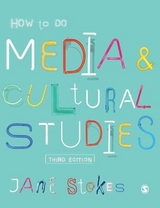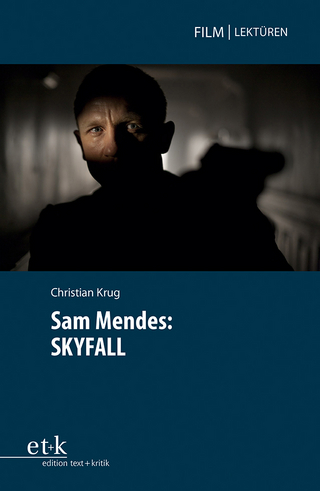
How to Do Media and Cultural Studies
SAGE Publications Ltd (Verlag)
978-1-84920-785-0 (ISBN)
- Titel erscheint in neuer Auflage
- Artikel merken
The Second Edition of this student favourite takes readers step-by-step through the theories, processes and methods of each stage of research, from how to create a research question to designing the project and writing it up. It gives students a clear sense of how their own work relates to broader scholarship and inspires understanding of why studying the media matters.
Now 20% bigger, new features include:
• Brand new chapters on the how and why of researching media and culture
• All new case studies spotlighting the international media landscape
• Online readings showing how methods get used in real research
• Essential new material on ethnography, digital content analysis, online surveys and researching blogs.
Perfect for students of all ranges, How to Do Media and Cultural Studies continues to provide the clearest and most accessible guide to media and cultural studies as students embark on their own research.
Jane Stokes is currently Senior Lecturer in Media Studies at the University of East London and has taught at the University of Kent at Canterbury, London South Bank University and London Metropolitan University. Jane’s interest in the media can be traced back to her days working on the student television station while studying English Literature at Sussex University. She has an MA in Film and Television Studies from the University of Westminster where Jane began teaching Media Studies in 1984. She moved to Los Angeles in 1989 to study for a PhD in Communication Theory and Research at the Annenberg School of Communication, USC. Jane has made research methods a teaching specialism, blending American and European approaches to communication, media and cultural studies.
Introduction
PART ONE: THINKING, THEORY AND PRACTICE
Chapter 1. How Do We Know Anything about Anything?
What Is Knowledge?
How Do You Build a Toaster?
Four Ways of Knowing
Ways of Knowing in Oral Cultures
The Impact of Writing on Ways of Knowing
Classical Epistemology and Rhetoric
So, What Makes a Good Argument?
The Modern Way: Seeing Is Believing and the Scientific Revolution
The Revolution of the Structure of Scientific Revolutions
The End of the Modern
Post-Modern Ways of Knowing
Chapter 2. Why Do We Do Media and Cultural Studies?
Approaches to Media and Culture before Media Studies
The Industrial Revolution, Modernity, Media and Culture
The Twentieth Century
The Payne Fund Studies
′Why We Fight′: Propaganda and World War II
The Frankfurt School
Technological Determinism and the Social Shaping of Technology
The French Influence and Cahiers du Cinéma
Mass Culture Debates in the 1950s
The Founding of British Cultural Studies
The 1960s and Cultural Studies in Academia
The 1970s′ Media Education Movement
The Turn to the Reader
Feminist Interventions
Sexuality, the Body and Queer Theory
Post-Colonialism, Identity, Race and Difference
New Media, New Paradigms?
PART TWO: METHODS OF ANALYSIS
Chapter 3. Getting Started
Getting Started
Designing Your Research Question: Industry, Text or Audience?
The Key Elements of a Research Question
Writing Your Research Question
Reviewing the Literature
Writing Your Project Proposal
Chapter 4. Researching Industries: Studying Institutions and Producers of Media and Culture
What Are the Media and Cultural Industries?
Studying the Media and Cultural Industries
Four Methods for Researching the Media and Cultural Industries
Archive Research
Case Study: Paddy Scannell and David Cardiff, 1991
Case Study: Sue Arthur, 2009
Discourse Analysis
Case Study: John T Caldwell, 2008
Case Study: Chrys Ingraham, 2008
Interviews
Case Study: Jeremy Tunstall, 1993
Case Study: Stefan Haefliger, Peter Jäger and Georg Von Krogh, 2010
Interviews About The Past
Case Study: Stuart L Goosman, 2005
Ethnographic Research
Case Study: Hortense Powdermaker, 1951
Case Study: Anthony Cawley, 2008
Methods and Approaches Discussed in this Chapter
Chapter 5. Researching Texts: Approaches to Studying Media and Cultural Content
How to Research Media and Cultural Content
Semiotic analysis
Case Study: Barthes, Roland, 1984
Case Study: Richard K Popp And Andrew L Mendelson, 2010
Case Study: Marcia A Morgado, 2007
Content Analysis
Case Study: Glasgow Media News Group, 1976
Case Study: Jeffery P Dennis, 2009
Case Study: James Curran, 2000
Discourse Analysis
Case Study: Kari Andén-Papadopoulos, 2009
Case Study: Alim, H Samy, Jooyoung Lee and Lauren Mason Carris, 2011
Typological Methods of Analysis
Genre Study
Case Study: Jane Feuer, 1982
Case Study: Jessica Ringrose And Valerie Walkerdine, 2008
Auteur Study
Case Study: Thomas Elsaesser, 2011
Star Study
Case Study: Richard Dyer, 1987
Comparison of Research Methods Discussed in this Chapter
Chapter 6. Researching Audiences: Who Uses Media and Culture? How and Why?
Methods Discussed in this Chapter
Why Study Audiences?
Researching Media Effects
The Ethics of Audience Research
Survey Research
Case Study: Ien Ang, 1985
Case Study: Lisa M Tripp, 2010
Case Study: Andrea Millward Hargrave, 2000
Focus Groups
Tim Healey and Karen Ross, 2002
Ethnography
Case Study: Daniel Miller 2011
Oral History
Case Study: Shaun Moores, 1988
Comparing Methods for Researching Audiences
PART THREE: PRESENTING YOUR WORK
Chapter 7. Getting Finished
Criteria for Assessment
Planning Your Work
The Project Contents
Style Matters
Where to Go from Here
Glossary
| Erscheint lt. Verlag | 16.11.2012 |
|---|---|
| Verlagsort | London |
| Sprache | englisch |
| Maße | 170 x 242 mm |
| Gewicht | 600 g |
| Themenwelt | Sozialwissenschaften ► Kommunikation / Medien ► Medienwissenschaft |
| Sozialwissenschaften ► Soziologie ► Empirische Sozialforschung | |
| ISBN-10 | 1-84920-785-2 / 1849207852 |
| ISBN-13 | 978-1-84920-785-0 / 9781849207850 |
| Zustand | Neuware |
| Haben Sie eine Frage zum Produkt? |
aus dem Bereich



